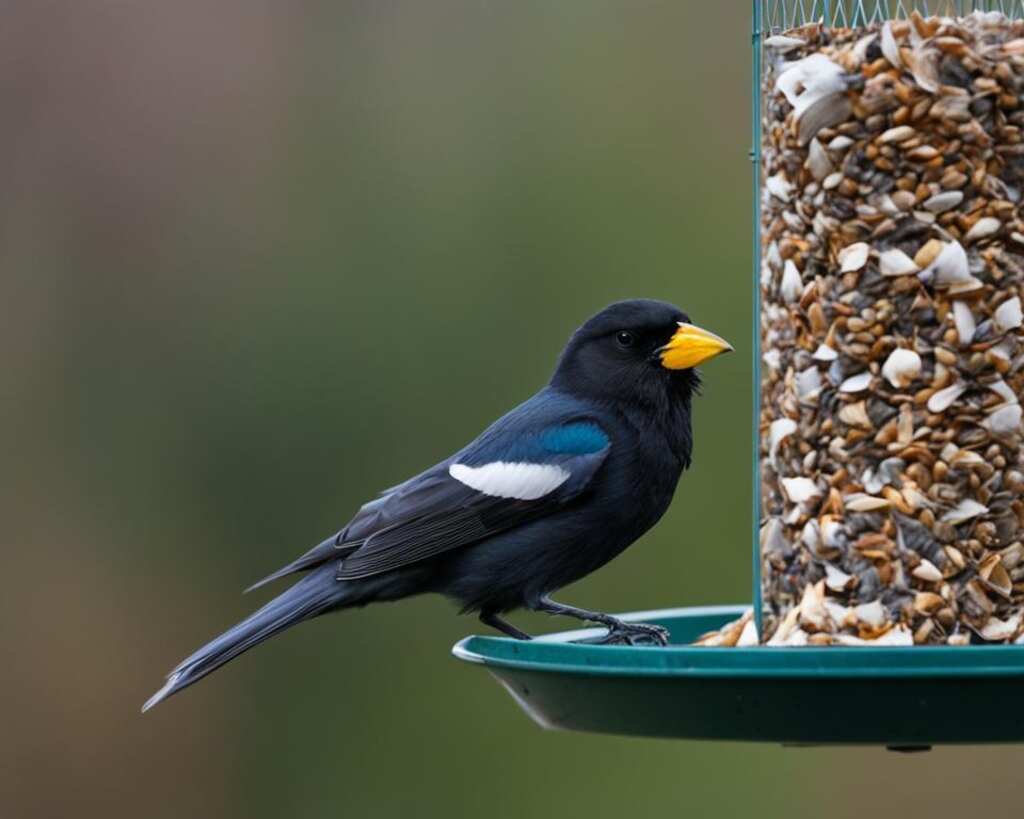Bird feeders have long been a popular practice among bird enthusiasts in the United States. They provide a way for people to connect with nature and offer assistance to birds during harsh conditions. However, there is a growing debate about their effects on bird populations. Some argue that bird feeders have negative effects and pose risks to birds’ health, while others believe they are beneficial.
In this article, I will explore both sides of the argument surrounding bird feeders. We will discuss the potential risks associated with bird feeding and the impacts it may have on bird health. Additionally, I will provide recommendations for responsible bird feeding practices to ensure the well-being of both birds and human enthusiasts.
Table of Contents
- 1 Key Takeaways:
- 2 The American Tradition of Bird Feeding and Its Recent Surge
- 3 Are Bird Feeders Bad for Birds?
- 4 Navigating the Bird Feeder Controversy
- 5 Benefits of Bird Feeders for Avian and Human Enthusiasts
- 6 The Dangers of Over-Reliance on Feeders Illustrated by Research
- 7 Ecological Alternatives to Traditional Bird Feeders
- 8 Proactive Measures to Safeguard Birds at Feeders
- 9 Conclusion
- 10 Source Links
- 11 Author
Key Takeaways:
- There is a debate about the effects of bird feeders on bird populations.
- Some argue that bird feeders have negative effects and pose risks to bird health.
- Bird feeders provide assistance to birds during harsh conditions.
- Responsible bird feeding practices are essential to ensure the well-being of birds.
- Further research is needed to fully understand the impacts of bird feeders on bird populations.
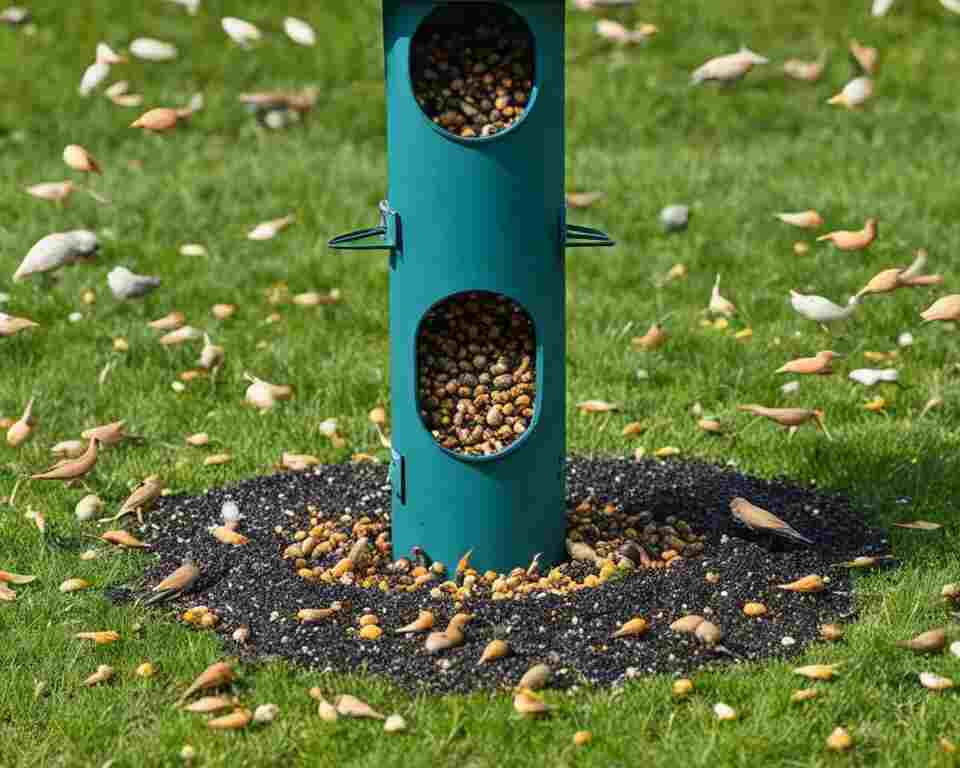
The American Tradition of Bird Feeding and Its Recent Surge
Bird feeding has a long-standing tradition in the United States, with millions of Americans participating in this activity. The history of bird feeders in the country showcases the evolution of feeding practices over time.
In the late 19th century, bird enthusiasts began placing simple wooden platforms or trays filled with food in their gardens to attract and feed birds. These early bird feeders were primarily handmade and served as a way to observe and appreciate avian visitors.
The recent pandemic-induced surge in bird feeding activities is a testament to the enduring love and fascination that people have for birds. With increased time spent at home, individuals turned to bird feeding as a source of joy and a way to connect with the natural world.
However, this surge in bird feeding has brought to light the clash between conservation ethics and recreational bird feeding. As more people participate in feeding birds, concerns have been raised about its potential implications for bird behavior, habitat reliance, and overall ecosystem balance.
Are Bird Feeders Bad for Birds?
When it comes to the impact of bird feeders on avian populations, there has been much debate and concern. In this section, we will explore the potential risks associated with bird feeding and how it can influence bird behavior. We will also look into the three major dangers that bird feeders pose: disease transmission, predation, and collision accidents.
Associating Humans with Food: A Double-Edged Sword
Birds are intelligent creatures that quickly learn and adapt to their surroundings. While bird feeders provide a reliable food source, they also create a dependency on humans for sustenance. This association between humans and food can have both positive and negative consequences.
Positive Consequences:
On one hand, birds may become more comfortable around humans, leading to closer interactions and providing opportunities for observation and enjoyment. This can be a positive experience for bird enthusiasts and researchers who can observe and study birds up close.
Negative Consequences:
On the other hand, the association with feeders can disrupt natural feeding behaviors and cause birds to rely solely on feeders, neglecting their foraging instincts and reducing overall foraging efficiency. This can lead to a decrease in the diversity of their diet and potentially impact their ability to survive in the absence of feeders.
It’s important to note that numerous scientific studies confirm that birds do not establish dependence on bird feeders. By examining bird behavior in the presence or absence of feeders, research consistently reveals birds’ ability to adapt and secure sustenance from natural sources. This capacity for self-regulation in foraging underscores the remarkable resilience and adaptability inherent in bird species.
In conclusion, while bird feeders can create a dependency on humans for food, birds have the ability to adapt and secure sustenance from natural sources. The association with feeders can have both positive and negative consequences, and it’s important to strike a balance between providing supplemental food and allowing birds to maintain their natural foraging behaviors.
Understanding the Big Three Risks: Disease, Predation, Collision
Despite their popularity among bird enthusiasts, feeders can pose significant risks to avian health. The first risk is the potential transmission of diseases. When numerous birds congregate around a feeder, there is an increased chance of spreading bacterial, viral, and fungal infections.
The second risk is predation. Bird feeders attract not only birds but also predators such as cats and squirrels. These predators can ambush unsuspecting birds, increasing the likelihood of predation and causing stress and fear among feeder visitors.
The third risk is collision accidents. Birds, especially those in flight, may collide with feeders, windows, or other structures near the feeding area. These collisions can result in injury or death, further highlighting the potential dangers associated with bird feeders.
The Complexity of Bird Feeders Impacting Avian Behavior
The impact of bird feeders on bird behavior is a complex issue. While they can alter feeding patterns and social dynamics, they can also provide opportunities for learning and adaptation. Research suggests that bird feeders can affect the competitiveness and aggressiveness of birds, as well as their territorial behaviors.
Additionally, certain bird species may become dominant at feeders, excluding other species from accessing food resources. This imbalance can disrupt natural ecological relationships and influence the populations and diversity of birds in the area.
Overall, the use of bird feeders can have both positive and negative consequences for bird behavior and ecology. It is crucial for bird enthusiasts to be aware of these impacts and take proactive measures to mitigate the potential risks and ensure the well-being of avian visitors.
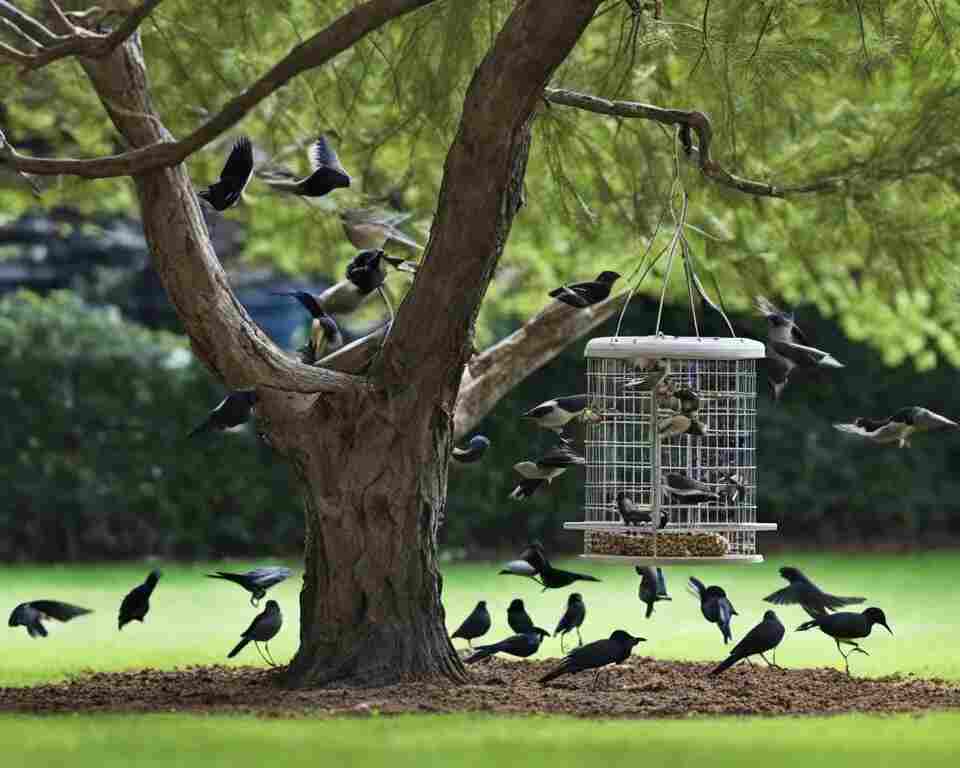
| Risks of Bird Feeders | Dangers of Bird Feeders | Impact of Bird Feeders on Bird Behavior |
|---|---|---|
| Potential disease transmission | Predation of birds by predators | Altered feeding patterns and social dynamics |
| Increased risk of collision accidents | Dependency on humans for food | Competitiveness and aggressiveness among birds |
| Disruption of natural ecological relationships |
As the debate on bird feeders continues to unfold, it is essential to explore the various perspectives and arguments surrounding the impact of these feeders on bird populations. Understanding the controversies and different viewpoints allows readers to make informed decisions about their own bird feeding practices.
On one side of the debate, proponents of bird feeders argue that they provide valuable assistance to birds, especially during harsh conditions such as winter or when natural food sources are scarce. By offering a consistent and supplemental food supply, bird feeders can help ensure the survival and well-being of avian species.
However, critics pose valid concerns about the potential negative effects of bird feeding. Some argue that bird feeders disrupt natural foraging behaviors, alter bird migration patterns, and create an unhealthy dependence on human-supplied food. Additionally, there are concerns about disease transmission among birds when they congregate around feeders.
It is crucial to consider both sides of the argument and weigh the potential benefits and risks of bird feeders. This way, bird enthusiasts can make informed decisions based on their local context, the needs of bird populations in their area, and the best practices for responsible bird feeding.
To further understand the controversy and make well-informed decisions, it is recommended to consult reputable sources, specialized bird organizations, and local experts who can provide valuable insights into the impacts of bird feeders on avian welfare.
| Arguments in Favor of Bird Feeders | Arguments Against Bird Feeders |
|---|---|
|
|
Benefits of Bird Feeders for Avian and Human Enthusiasts
Bird feeders offer a range of benefits for both birds and bird enthusiasts. These advantages include aiding bird survival during harsh conditions and providing a unique opportunity for humans to connect with nature. Let’s explore the positive effects of bird feeders in more detail.
Aiding Bird Survival During Harsh Conditions
Bird feeders play a crucial role in aiding bird survival, especially during challenging weather conditions such as winter or drought. When natural food sources become scarce, bird feeders provide a reliable and supplemental source of food for birds. This can help ensure that our feathered friends have access to the nutrition they need to survive and thrive.
By offering a variety of bird feeders and food options, we can attract a diverse range of bird species to our yards. This contributes to the overall biodiversity of our environment and promotes a healthier ecosystem. Additionally, bird feeders create a safe space where birds can congregate and share information about food sources, further enhancing their chances of survival.
The Role of Bird Feeders in Connecting Humans to Nature
Bird feeders have a unique ability to connect humans to the natural world around them. By observing birds as they visit the feeders, we gain a deeper appreciation for the beauty and diversity of avian species. The peaceful and harmonious sight of birds feeding can bring a sense of tranquility and awe, helping us to reconnect with nature in our busy lives.
Moreover, bird feeders offer an educational opportunity, especially for children, to learn about different bird species, their behaviors, and their dietary preferences. This hands-on experience promotes a greater understanding and respect for the natural world, fostering environmental consciousness and a desire to protect our feathered friends and their habitats.
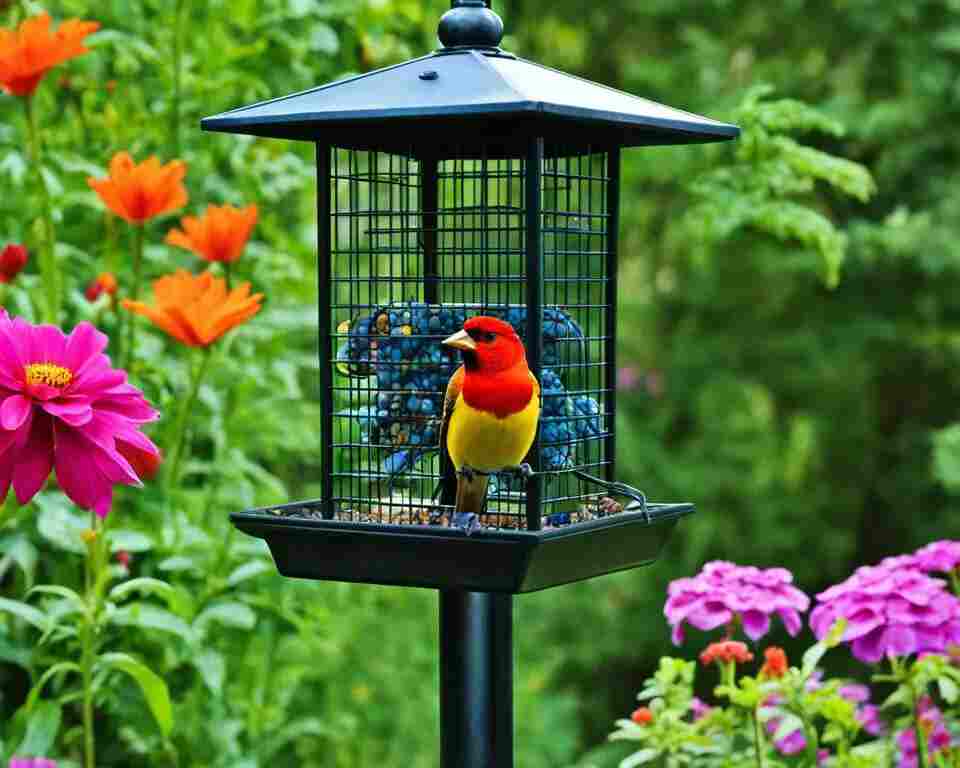
| Benefits of Bird Feeders | Description |
|---|---|
| Supplemental Food Source | Provides birds with food during harsh conditions when natural food sources are scarce. |
| Biodiversity Enhancement | Attracts a diverse range of bird species, contributing to the overall biodiversity of the environment. |
| Opportunity for Nature Observation | Allows humans to observe and appreciate the beauty and diversity of avian species. |
| Educational Tool | Provides a hands-on learning experience for children to learn about different bird species and their behaviors. |
| Environmental Consciousness | Fosters a sense of environmental responsibility and a desire to protect bird populations and their habitats. |
Overall, bird feeders offer numerous advantages for both birds and bird enthusiasts. They provide a lifeline for birds during harsh conditions while offering humans a window into the wonders of the natural world. By practicing responsible bird feeding, we can maximize the benefits and positive impacts of bird feeders on both avian species and ourselves.
The Dangers of Over-Reliance on Feeders Illustrated by Research
Over-reliance on bird feeders can pose significant dangers to bird populations, as evidenced by scientific research. This section will explore the various risks associated with relying too heavily on feeders and highlight the need for responsible bird feeding practices.
Disease Outbreaks Linked to Bird Feeders
The close proximity of birds at feeders creates an ideal environment for the transmission of diseases. Research has shown that bird feeders can become hotspots for avian diseases, leading to outbreaks among bird populations. Pathogens such as salmonella and avian pox can spread rapidly in crowded feeder settings, jeopardizing the health and well-being of birds.
To minimize the risk of disease outbreaks, it is crucial to maintain strict hygiene practices when maintaining bird feeders. Regular cleaning of feeders with a mild bleach solution and providing fresh, uncontaminated food can help prevent the spread of harmful pathogens.
Behavioral Changes in Bird Populations Due to Feeding Practices
Feeding at bird feeders can influence the behavior of bird populations. Research suggests that overreliance on feeders may disrupt natural foraging patterns and lead to a decreased ability to find food in the wild. Birds may become dependent on human-provided food, resulting in reduced foraging skills and reliance on artificial food sources.
Furthermore, feeder dominance can occur, where certain aggressive species monopolize the food resources, excluding other bird species from accessing the food. This can disrupt the natural balance and diversity of bird populations in an area.
Feeding Disease: The Scientific Evidence
Scientific studies have provided evidence that bird feeding practices can contribute to the spread of diseases among avian populations. Feeder use can facilitate the transmission of pathogens through direct contact with infected birds or contaminated feeding surfaces. The concentration of birds at feeders increases the likelihood of disease transmission, making it a significant concern for bird enthusiasts.
To mitigate the risk of disease transmission, it is advisable to clean feeders regularly, provide multiple feeding stations to reduce crowding, and use seed trays or platforms to minimize direct contact between birds and contaminated surfaces.
| Dangers of Over-Reliance on Feeders | Research Findings |
|---|---|
| Disease Outbreaks | Studies have identified bird feeders as potential hotspots for disease transmission, leading to outbreaks among bird populations. |
| Behavioral Changes | Research suggests that reliance on feeders can disrupt natural foraging patterns and result in decreased foraging skills. |
| Feeding Disease | Scientific evidence confirms that bird feeding practices contribute to the spread of diseases among avian populations. |
Ecological Alternatives to Traditional Bird Feeders
As bird enthusiasts, it is important to consider ecological alternatives to traditional bird feeders. By creating bird-friendly habitats that provide natural food sources, we can reduce our reliance on artificial feeders and promote a more sustainable relationship with our avian friends.
One effective strategy for attracting birds is to incorporate native plants into your landscape. Native plants provide essential food sources, such as berries, seeds, and nectar, that are specifically adapted to the local bird species. Not only do these plants provide nutritious meals for birds, but they also support the overall health of the ecosystem.
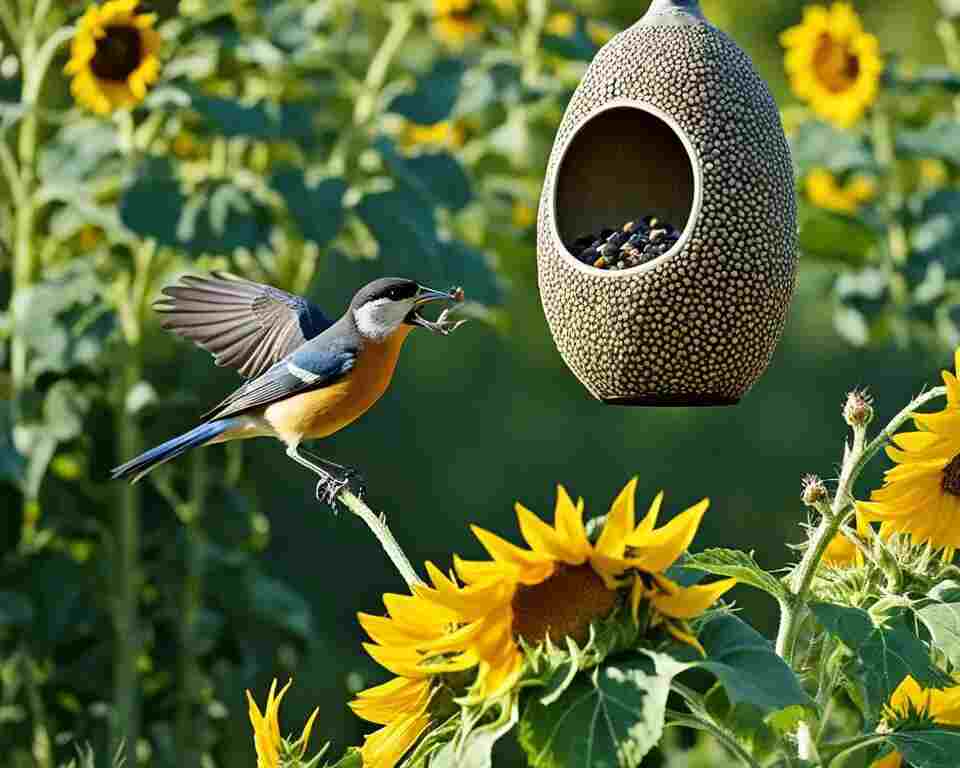
Another way to create an ecological bird-friendly environment is to incorporate water features. Birds need water not only for drinking but also for bathing and preening their feathers. By providing a shallow birdbath or a small pond, you can attract a wide variety of bird species.
In addition to native plants and water features, you can enhance your habitat by providing natural nesting sites. Consider adding birdhouses or leaving dead trees standing (if safe) to create nesting opportunities for birds. Providing shelter is essential for their survival, especially during extreme weather conditions.
By embracing these ecological alternatives, we can support the well-being of birds while minimizing the potential risks associated with traditional bird feeders. Let’s create a harmonious and sustainable environment where birds can thrive naturally.
| Ecological Alternatives to Traditional Bird Feeders | Benefits |
|---|---|
| Native Plants |
|
| Water Features |
|
| Nesting Sites |
|
Proactive Measures to Safeguard Birds at Feeders
Best Practices for Feeder Maintenance and Hygiene
Ensuring proper maintenance and hygiene of bird feeders is essential for minimizing harm to birds and promoting their well-being. Here are some best practices to follow:
- Regularly clean and disinfect feeders using a mild solution of bleach and water to prevent the spread of diseases.
- Remove any moldy or spoiled food promptly, as it can be harmful to birds.
- Provide an adequate supply of fresh and clean water near the feeding area, changing it regularly to prevent bacterial contamination.
- Inspect feeders for any damage or wear and replace them if necessary to ensure the safety of birds.
- Position feeders away from places that may harbor predators, such as dense vegetation or low-hanging branches.
Strategies to Minimize Accidental Harm to Birds
While bird feeders can provide valuable assistance to birds, there are some potential risks that need to be minimized. Here are some strategies to consider:
- Choose feeders with appropriate perches and spacing to prevent bird collisions and injuries.
- Place feeders strategically to minimize the risk of birds colliding with windows, such as positioning them closer to outdoor structures or using window decals to break up reflections.
- Regularly inspect the feeding area for any hazards, such as tangled strings or materials that could entangle birds.
- Avoid using artificial food coloring or additives in bird food, as they may be harmful to birds.
- Monitor feeder activity and adjust the amount of food provided to prevent overfeeding and minimize the accumulation of uneaten food.
Responsibility and Ethics of Providing for Wild Birds
Responsible bird feeding goes beyond simply providing food. It involves understanding the impact of our actions and making ethical choices to ensure the well-being of birds. Consider the following:
- Use bird feeders as a supplemental food source, not as the sole dependency for bird survival.
- Plant native vegetation that provides natural food sources for birds, promoting a diverse and sustainable ecosystem.
- Monitor and regulate the feeding activity to prevent overcrowding and excessive competition among birds.
- Be mindful of local regulations and restrictions on bird feeding, respecting the natural balance and ecological integrity of the area.
- Continuously educate yourself about responsible bird feeding practices and stay informed about the latest research and recommendations in the field.
Conclusion
In conclusion, finding a balance between bird welfare and feeding enjoyment is key to responsible bird feeding practices. While bird feeders can provide valuable assistance to birds during harsh conditions, it is important to be aware of the potential risks they pose. By understanding the impacts of bird feeders on bird behavior, disease transmission, predation, and collision accidents, we can make informed decisions to minimize harm to birds.
Looking to the future, further research is needed to better comprehend the complex relationship between bird feeders and bird populations. By understanding the long-term effects of sustained bird feeding, we can develop more effective strategies to mitigate risks and support bird health and diversity. It is essential for researchers and bird enthusiasts to collaborate on this important area of study.
As responsible bird feeders, it is crucial that we reflect on our personal takeaways and implement best practices. Regular feeder maintenance and hygiene, such as cleaning feeders and providing fresh food, can help prevent disease transmission.
Minimizing accidental harm to birds by placing feeders away from windows and using predator deterrents is also important. Moreover, fostering a sense of responsibility and ethics in providing for wild birds ensures the well-being of both bird populations and human enthusiasts.

